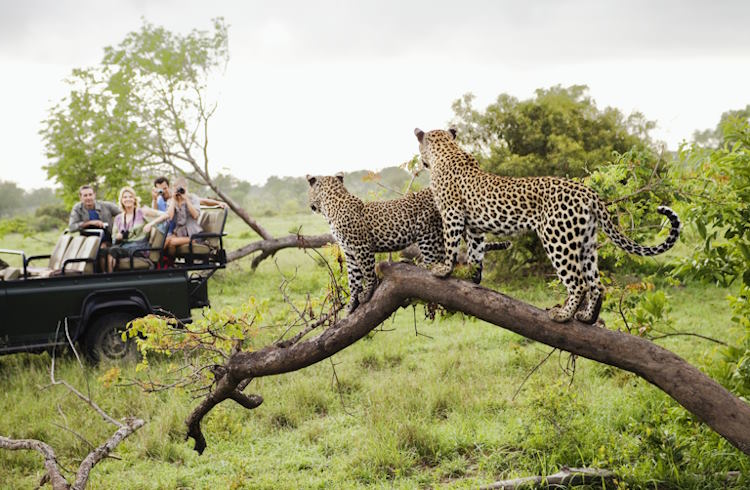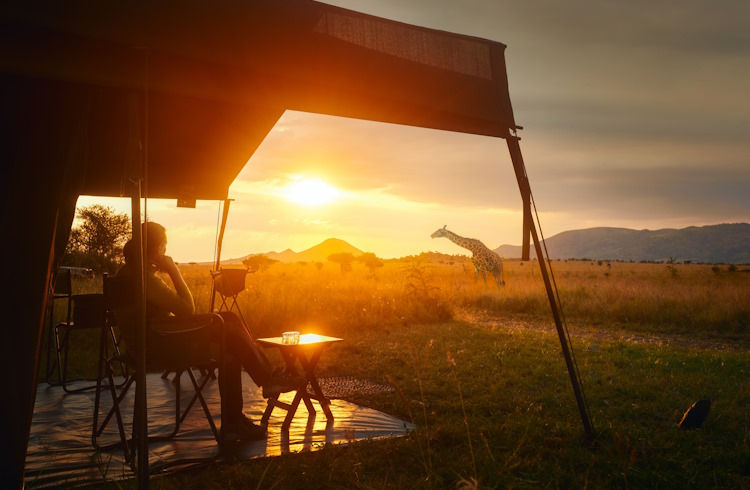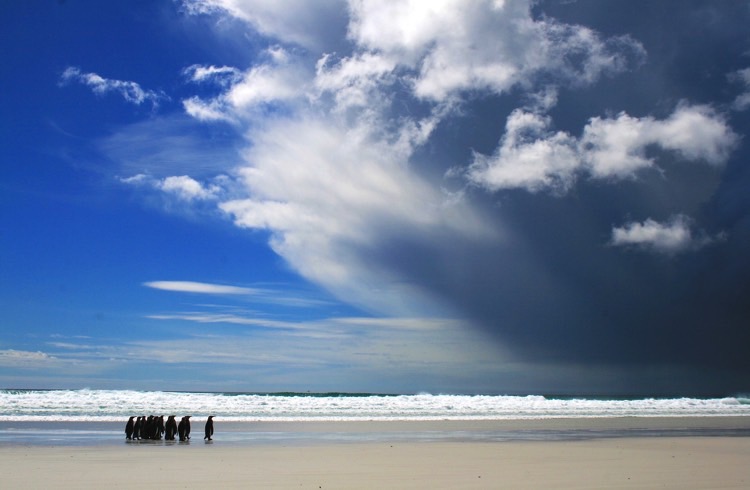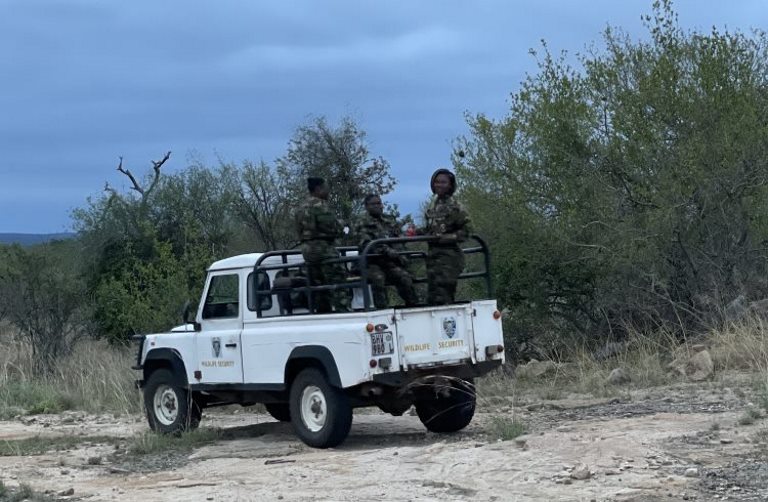How to Stay Safe on an African Safari: Tips From a Guide
Heading out on an African safari in search of Big 5 animals is an experience no one forgets. Here’s how to make it memorable for all the right reasons.
 Photo © Getty Images / moodboard
Photo © Getty Images / moodboard
“Move!” our guide says. “Bunch up, don’t run, get behind that tree.”
A large bull elephant has suddenly reversed course. He’s far away but he’s still coming toward us.
Mark “Butch” Butcher, managing director of Imvelo Safaris, had prepared us for this exact moment before heading out through Zimbabwe’s Hwange National Park with him on a “bush walk.” The safety talk boiled down to this: do what he says, when he says it.
The six of us close ranks and backtrack, keeping a distant tree between us and the elephant. The woody cover makes it harder for him to see us. When he catches our scent, he flares his ears and runs away, exactly as Butcher had predicted.
“To you that was probably scary,” Butcher says. “To me, that was a textbook encounter. Out here, I know exactly what to do to keep everyone safe.”
Trusting your guide to facilitate encounters like those is what makes going on safari so fun. Here, some tips to keep in mind on your next adventure to witness some of Africa’s most incredible creatures.
- Safari safety tips: top rules to follow
- How to stay safe at a safari camp
- Tips for spotting wildlife
- How to stay healthy on safari
Safari safety tips: top rules to follow
Riding around the bush looking for animals from a rugged vehicle – a game drive – is always popular. It’s also generally the safest way to get close to some very big animals. Tyrone McKeith, who has been guiding in Zambia for two decades as an owner of Classic Zambia, explains the rules.
Stay in your seat
Animals in African parks are often used to seeing safari vehicles that smell like humans. “For them, human plus vehicle equals fine,” McKeith says. Problems arise when that equation changes: someone stands up, switches seats, or tries to get on top of the vehicle.
“As soon as you break the shape of the vehicle, that changes everything,” McKeith says. “Resist the urge to move around to get a better look.”
Do that, and it’s over. “The animals will probably run off,” he says. In the worst-case scenario, your behavior can incite the animal to charge. Under no circumstances should you jump out of the vehicle without asking your guide if it’s okay first.
Stay quiet
Human voices really spook wildlife. “Some are not used to that at all,” McKeith says. “If you’re being loud and obnoxious and standing, no animal is going to stick around for that.”
Be still and quiet and “you're going to have the best sightings because the animals will be acting calmly and naturally,” McKeith says.
How to stay safe at a safari camp
Safari camps are magical places – starry skies, awesome food, and the otherworldly sounds of wildlife filling the night. But despite the cushy bed and flushing toilet, you are very much a guest in nature’s house. Camp is where you’re most likely to have an unwanted encounter. Here’s how to avoid that.
Never walk around alone at night
Always walk with an escort when leaving from or returning to your room at night, no exceptions. You could easily come across a grazing hippo, a wandering elephant, or even a pride of lions hanging out by your door.
Rooms often have two-way radios to call for an escort, or the escort will sit within shouting distance of the main lodge. Some even have air horns to scare an animal away and sound the alarm. “If there’s a problem animal that won’t leave,” says McKeith, “we’ll bring a vehicle around to collect the guest instead of risking the walk around it.”
If you do happen across an animal, don’t approach it. Walk slowly back to the closest structure, be it your room, another room, or the lodge. Never run or turn your back on a lion. Just like your house cat, they’ll pounce.

Keep critters out of your tent
The easiest way to keep unwanted visitors out of your room is to keep your doors closed or tent zipped. Animals are much more likely to try to enter if all they have to do is walk in. This is particularly true of baboons in areas where they’ve associated people with food. In other areas, “baboons are of zero safety concern,” McKeith says.
Bring your shoes inside
The warmth and moisture of your shoes attract scorpions, so shake them out before putting them on. Check the toilet paper roll before blindly reaching for it, too. Scorpions sometimes like to hang where it’s dry, especially during wetter months.
“Everyone always asks about snakes,” McKeith says. In general, snakes want nothing to do with humans and will stay away. If one does slither in, “just let it pass on through,” McKeith says. Chances are very slim that it will be venomous.
When going to the loo at night, bring a light source. Don’t just leave the light on all night – that will attract insects. “Bathrooms aren’t big enough to harbor a hippo,” McKeith laughs. “But I guess you never know.”
Tips for spotting wildlife
Staying seated, quiet, and following directions will help everyone see more animals. But there’s more you can do, too.
Use more than just your eyes
“Once you get out into the bush, listen,” McKeith says. A bark or a snort can alert you to the presence of something. If you hear something at night, say so. “Say, ‘I thought I heard a lion in that direction around 3am,’” McKeith says. “Your guide is brilliant, and they know their thing, but the more you as a guest can interact and be a part of the team, your chances of seeing more are far better than you just sitting on your phone waiting for your guide to point something out.”
Wear the right clothes
There’s a reason people wear “those safari clothes.”
“Animals often only see in black and white,” McKeith says. So don’t wear black or white. Natural tones will help you blend in. Loose-fitting long sleeves and long pants will also keep you cooler than shorts and a T-shirt, as well as protect you from bug bites. Comfortable athletic shoes are ideal. You don’t need big hiking boots, but open toed shoes or Crocs are no-nos. “Thorns will go right through them,” McKeith says.
How to stay healthy on safari
I’ve been on half a dozen safaris and have never had so much as a belly ache let alone malaria. Make sure your vaccinations are up to date, but otherwise use common sense. Protect yourself from bug bites with long sleeves and long pants. (Ask your doctor if you should bring antimalarials; but go in the dry season – the best time to see wildlife – and you may see zero mosquitos). Wear a sun hat. Wash your hands.
“The biggest problem I see,” McKeith says, “is dehydration.” Guests arrive excited, they’ve flown a very long way, and they haven’t had much water. “They eat dinner and the next day have a stomach ache,” McKeith says. “99 percent of the time, it’s not what they ate because everyone else is fine. It’s dehydration.”


1 Comment
Wildlife is one of the best sightings in Africa and I loved how you made us learn from your story. It was an interesting one to read. Evan Tours is one agency that embarks on wildlife too in West Africa. In all wildlife is a natural excitement.